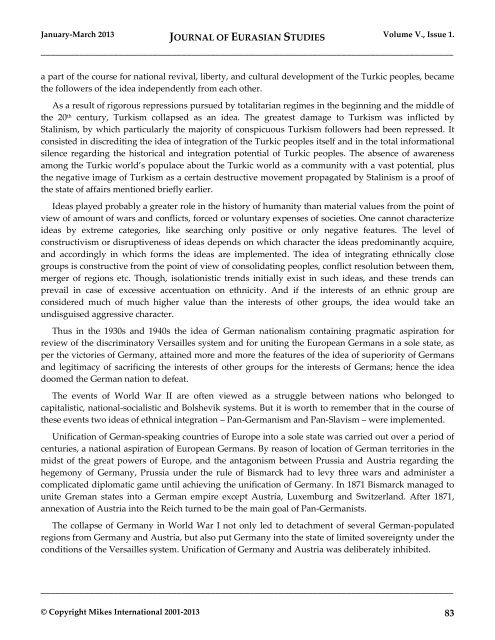JOURNAL OF EURASIAN STUDIES Journal of the Gábor Bálint de ...
JOURNAL OF EURASIAN STUDIES Journal of the Gábor Bálint de ...
JOURNAL OF EURASIAN STUDIES Journal of the Gábor Bálint de ...
You also want an ePaper? Increase the reach of your titles
YUMPU automatically turns print PDFs into web optimized ePapers that Google loves.
January-March 2013 <strong>JOURNAL</strong> <strong>OF</strong> <strong>EURASIAN</strong> <strong>STUDIES</strong> Volume V., Issue 1.<br />
_____________________________________________________________________________________<br />
a part <strong>of</strong> <strong>the</strong> course for national revival, liberty, and cultural <strong>de</strong>velopment <strong>of</strong> <strong>the</strong> Turkic peoples, became<br />
<strong>the</strong> followers <strong>of</strong> <strong>the</strong> i<strong>de</strong>a in<strong>de</strong>pen<strong>de</strong>ntly from each o<strong>the</strong>r.<br />
As a result <strong>of</strong> rigorous repressions pursued by totalitarian regimes in <strong>the</strong> beginning and <strong>the</strong> middle <strong>of</strong><br />
<strong>the</strong> 20 th century, Turkism collapsed as an i<strong>de</strong>a. The greatest damage to Turkism was inflicted by<br />
Stalinism, by which particularly <strong>the</strong> majority <strong>of</strong> conspicuous Turkism followers had been repressed. It<br />
consisted in discrediting <strong>the</strong> i<strong>de</strong>a <strong>of</strong> integration <strong>of</strong> <strong>the</strong> Turkic peoples itself and in <strong>the</strong> total informational<br />
silence regarding <strong>the</strong> historical and integration potential <strong>of</strong> Turkic peoples. The absence <strong>of</strong> awareness<br />
among <strong>the</strong> Turkic world’s populace about <strong>the</strong> Turkic world as a community with a vast potential, plus<br />
<strong>the</strong> negative image <strong>of</strong> Turkism as a certain <strong>de</strong>structive movement propagated by Stalinism is a pro<strong>of</strong> <strong>of</strong><br />
<strong>the</strong> state <strong>of</strong> affairs mentioned briefly earlier.<br />
I<strong>de</strong>as played probably a greater role in <strong>the</strong> history <strong>of</strong> humanity than material values from <strong>the</strong> point <strong>of</strong><br />
view <strong>of</strong> amount <strong>of</strong> wars and conflicts, forced or voluntary expenses <strong>of</strong> societies. One cannot characterize<br />
i<strong>de</strong>as by extreme categories, like searching only positive or only negative features. The level <strong>of</strong><br />
constructivism or disruptiveness <strong>of</strong> i<strong>de</strong>as <strong>de</strong>pends on which character <strong>the</strong> i<strong>de</strong>as predominantly acquire,<br />
and accordingly in which forms <strong>the</strong> i<strong>de</strong>as are implemented. The i<strong>de</strong>a <strong>of</strong> integrating ethnically close<br />
groups is constructive from <strong>the</strong> point <strong>of</strong> view <strong>of</strong> consolidating peoples, conflict resolution between <strong>the</strong>m,<br />
merger <strong>of</strong> regions etc. Though, isolationistic trends initially exist in such i<strong>de</strong>as, and <strong>the</strong>se trends can<br />
prevail in case <strong>of</strong> excessive accentuation on ethnicity. And if <strong>the</strong> interests <strong>of</strong> an ethnic group are<br />
consi<strong>de</strong>red much <strong>of</strong> much higher value than <strong>the</strong> interests <strong>of</strong> o<strong>the</strong>r groups, <strong>the</strong> i<strong>de</strong>a would take an<br />
undisguised aggressive character.<br />
Thus in <strong>the</strong> 1930s and 1940s <strong>the</strong> i<strong>de</strong>a <strong>of</strong> German nationalism containing pragmatic aspiration for<br />
review <strong>of</strong> <strong>the</strong> discriminatory Versailles system and for uniting <strong>the</strong> European Germans in a sole state, as<br />
per <strong>the</strong> victories <strong>of</strong> Germany, attained more and more <strong>the</strong> features <strong>of</strong> <strong>the</strong> i<strong>de</strong>a <strong>of</strong> superiority <strong>of</strong> Germans<br />
and legitimacy <strong>of</strong> sacrificing <strong>the</strong> interests <strong>of</strong> o<strong>the</strong>r groups for <strong>the</strong> interests <strong>of</strong> Germans; hence <strong>the</strong> i<strong>de</strong>a<br />
doomed <strong>the</strong> German nation to <strong>de</strong>feat.<br />
The events <strong>of</strong> World War II are <strong>of</strong>ten viewed as a struggle between nations who belonged to<br />
capitalistic, national-socialistic and Bolshevik systems. But it is worth to remember that in <strong>the</strong> course <strong>of</strong><br />
<strong>the</strong>se events two i<strong>de</strong>as <strong>of</strong> ethnical integration – Pan-Germanism and Pan-Slavism – were implemented.<br />
Unification <strong>of</strong> German-speaking countries <strong>of</strong> Europe into a sole state was carried out over a period <strong>of</strong><br />
centuries, a national aspiration <strong>of</strong> European Germans. By reason <strong>of</strong> location <strong>of</strong> German territories in <strong>the</strong><br />
midst <strong>of</strong> <strong>the</strong> great powers <strong>of</strong> Europe, and <strong>the</strong> antagonism between Prussia and Austria regarding <strong>the</strong><br />
hegemony <strong>of</strong> Germany, Prussia un<strong>de</strong>r <strong>the</strong> rule <strong>of</strong> Bismarck had to levy three wars and administer a<br />
complicated diplomatic game until achieving <strong>the</strong> unification <strong>of</strong> Germany. In 1871 Bismarck managed to<br />
unite Greman states into a German empire except Austria, Luxemburg and Switzerland. After 1871,<br />
annexation <strong>of</strong> Austria into <strong>the</strong> Reich turned to be <strong>the</strong> main goal <strong>of</strong> Pan-Germanists.<br />
The collapse <strong>of</strong> Germany in World War I not only led to <strong>de</strong>tachment <strong>of</strong> several German-populated<br />
regions from Germany and Austria, but also put Germany into <strong>the</strong> state <strong>of</strong> limited sovereignty un<strong>de</strong>r <strong>the</strong><br />
conditions <strong>of</strong> <strong>the</strong> Versailles system. Unification <strong>of</strong> Germany and Austria was <strong>de</strong>liberately inhibited.<br />
_____________________________________________________________________________________<br />
© Copyright Mikes International 2001-2013 83

















